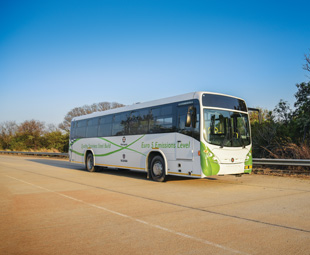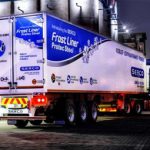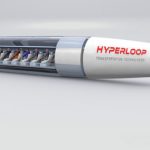Scania goes soot free

Scania has joined the Global Industry Partnership on Soot-Free Clean Bus Fleets! CHARLEEN CLARKE asked Alan Hugo, general manager bus and coach at Scania South Africa, about the significance of this development
Buses have, in the past, been associated with soot or black carbon. Of all buses sold in the world today, less than one-fifth have soot-free engines!
“Black carbon is a significant component of fine particulate matter that contributes to outdoor air pollution, and has been linked to a series of adverse health effects, in particular premature mortality,” says Hugo. “Furthermore, black-carbon emissions contribute significantly to global warming and climate change,” he elaborates.
What the world has needed is an initiative that supports the well-being of people living in cities across the globe. Enter the Global Industry Partnership on Soot-Free Clean Bus Fleets, a public statement committing bus manufacturers to providing soot-free buses.
Led by the International Council on Clean Transportation (ICCT) and United Nations Environment in cooperation with the C40 Cities Climate Leadership Group and the Centro Mario Molina, Chile, this initiative is undoubtedly good news for the environment.
In terms of this initiative, Johannesburg will take delivery of soot-free buses in 2018. So, too, will Abidjan, Accra, Addis Ababa, Bangkok, Bogotá, Buenos Aires, Casablanca, Dar es Salaam, Dhaka, Istanbul, Jakarta, Lagos, Lima, Manila, Mexico City, Nairobi, Santiago, São Paulo, and Sydney.
Some of these cities have already committed themselves to start procuring cleaner buses, and Scania presently delivers soot-free buses to several of the targeted countries.
These cities will need to ensure the availability of fuel for engines that meet the Euro-6 or US 2010 emission standards – including diesel fuel with less than 10 ppm sulphur and other low-carbon alternative fuels, such as biodiesel, gas and ethanol.
Hugo says it came as no surprise when Scania joined the Global Industry Partnership. “Scania, a leader in the field of sustainability, was an obvious signatory. In 2016, Scania sold 2 583 Euro-6, soot-free buses, representing 30,5 percent of total bus sales.
“We have one of the widest ranges of alternative fuel/low emission engines, but, of course, sustainability is about so much more than just alternative fuels; it’s about offering a business proposition that maximises efficiency and minimises waste in the whole transport chain,” he contends.
When this happens, numerous benefits kick into play. “We can positively influence the environment and the cost of operation. Furthermore, we can provide safe and reliable transport solutions,” he explains.
Of course, these “green” options need to be affordable. “Sustainability is based on three pillars: people, planet and profit. We are mindful of the profit element. Scania is already able to provide operators with affordable solutions. Our ‘green’ solutions offer a lower total operating cost. Fuel is the biggest cost driver in transport operations – and the local price of gas is substantially lower than that of conventional diesel,” Hugo points out.
So, there you have it. Johannesburg is set to be greener than ever – and this is great news for the environment and the pocket alike!
Published by
Focus on Transport
focusmagsa




